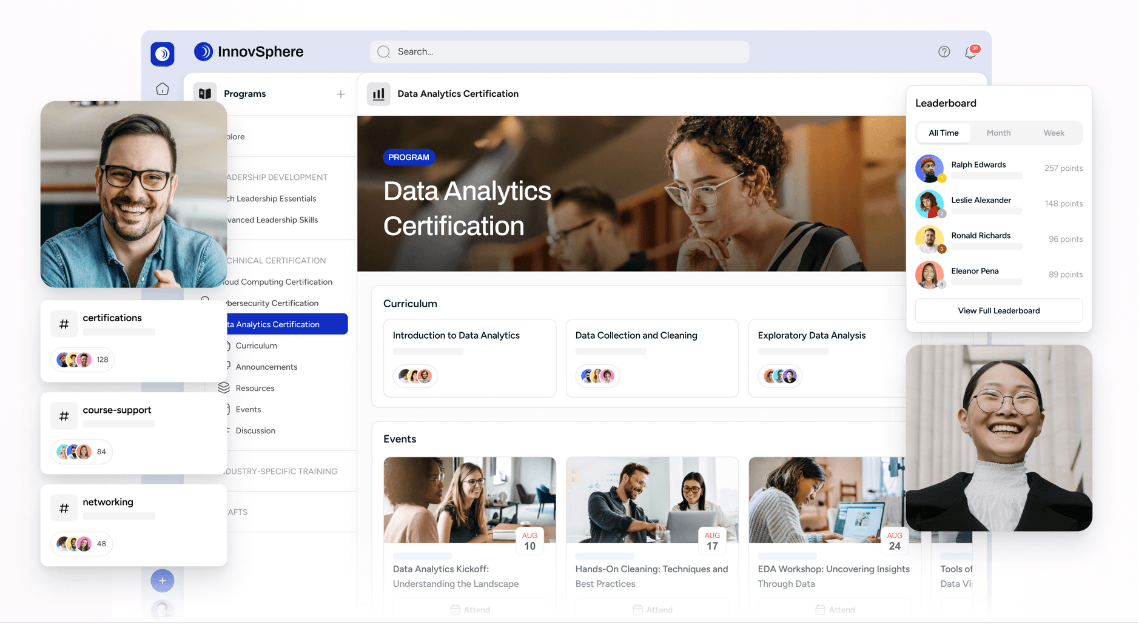Top AI Tools for Technical Training to Upskill Your Employees in 2026

TL;DR
- What it enables: Develops specialized technical skills and knowledge required for specific job tasks and roles
- What it includes: Formal degree programs, online courses, certifications, and AI-powered learning platforms
- Key elements: Structured curriculum, practical skills development, industry-relevant content, and flexible delivery methods
- Top formats for 2026 include: AI-enhanced online courses, digital certification programs, and tech-based learning solutions
- Why it matters: Bridges skills gaps, enhances productivity, improves retention, and ensures organizational competitiveness
What is technical training?
Technical training is a specialized form of employee training that focuses on developing the technical skills and knowledge required to perform specific job tasks.
Unlike general training programs, technical training is tailored to equip employees with the expertise needed to master the technical aspects of their roles. This type of training is crucial for staying current with industry trends and technologies, ensuring that employees can perform their jobs efficiently and effectively.
The importance of technical training cannot be overstated.
In today’s fast-paced and technology-driven world, organizations must remain competitive, innovative, and compliant with industry regulations.
Technical training helps bridge the skills gap, enhancing employee productivity and job satisfaction. When employees are confident in their technical abilities, they are more likely to be engaged and motivated, leading to better performance and higher retention rates.
Ultimately, investing in technical training is an investment in the organization’s future success.
What are the different types of technical training programs?
Formal education and degree programs
Formal education and degree programs are the traditional avenues for technical training, typically provided by universities, colleges, and vocational schools.
These programs typically lead to academic qualifications like degrees, diplomas, or certificates and provide a structured and comprehensive education in technical fields.
They often cover theoretical and practical skills, ensuring that learners understand their chosen field deeply.
Formal education and degree programs are ideal for individuals who want to pursue a career in a specific technical field or advance their existing technical skills.
These programs offer a rigorous curriculum that prepares students for the demands of the industry, making them valuable assets to any organization.
By completing a formal education program, employees can demonstrate their commitment to their profession and readiness to tackle complex technical challenges.
Online courses and certifications
Online courses and certifications have become a popular form of technical training due to their flexibility and convenience.
Delivered via digital platforms and eLearning modules, these courses cover a wide range of technical topics and can be completed at the learner’s own pace. Online courses and certifications are often provided by universities, online course providers, or professional organizations, making them accessible to a broad audience.
These programs are ideal for individuals who want to upskill or reskill in a specific technical area.
For organizations, online courses offer a cost-effective way to provide ongoing technical training and development opportunities for their employees.
By enrolling in online courses, employees can stay up-to-date with the latest industry trends and technologies, ensuring that they remain competitive in their roles. Additionally, certifications from reputable providers can enhance an employee’s credentials, making them more valuable to their organization.
Here's an example of how to create custom certificates in an LMS:
By understanding the different types of technical training programs available, organizations can choose the best options to meet their training needs and support their employees’ learning journeys.
🪩 Want to create certification programs? Here are the top certification platforms!
Why use AI to level up your technical training programs?
In today’s fast-paced business landscape, technical training is not just a trend; it’s a vital element for success.
It empowers employees with the technical skills necessary to operate specific technologies or services, enhancing their job performance and boosting overall productivity. Unlike generic corporate training, technical training is tailored and detailed, focusing on the distinct requirements of various job roles.
Technical training can be delivered in multiple formats, such as online courses, traditional classroom settings, and on-the-job training. Selecting and implementing various training methods is crucial to ensure the training aligns with organizational needs and leverages the flexibility of tech-based solutions like online learning and eLearning.

Each format has its unique advantages, yet the ultimate goal remains consistent: equipping employees with the tools and knowledge they need to excel in their roles.
Providing a detailed training schedule to employees before implementing training programs is essential.
This allows employees to prepare adequately and manage their time effectively to complete any necessary prerequisites. Whether it’s mastering a new software application or understanding complex processes, technical training, and even compliance training ensures employees are well-equipped to tackle their job challenges.
As we progress, we will delve into the top AI tools available for technical training in 2026.
These tools not only make the learning journey more engaging and effective but also align with the company’s business goals by providing relevant information and valuable insights.









